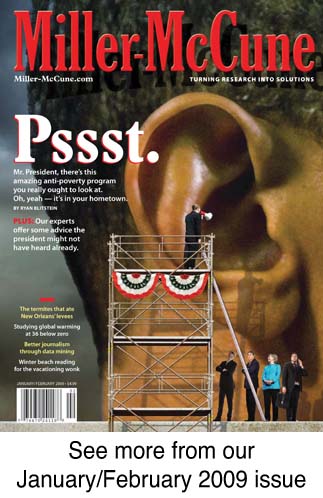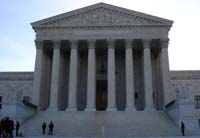As the lengthy, contentious 2008 presidential election campaign wound to a close, it wasn’t hard to pinpoint the overwhelming focal point: It was the economy, stupid. All three debates between Barack Obama and John McCain began with extensive discussions of how their tax plans and campaign platforms would salve the deepening credit crunch and soothe the plunging stock markets, putting all other issues — even the wars in Iraq and Afghanistan — squarely on a back burner set to “low.”
But the presidency of the United States is not a glorified chair in macroeconomics, and it’s no secret that President Obama’s historic ascension to the Oval Office carries with it a broad set of truly daunting challenges. It’s also clear that Obama — a former president of the Harvard Law Review and a professor of constitutional law at the appreciates the input and perspective of working faculty; three of his Harvard Law School classmates served on his transition team, largely composed of academics.

As a magazine that focuses on the intersection of public policy and research, much of it academic, Miller-McCune wanted to give Obama a little help. We figured he’d heard from enough economists, so we asked a collection of leading lights at universities across the country to offer advice on topics other than the economy. Specifically, we asked these writer-thinkers to address issues they thought weren’t getting the coverage they deserved during the campaign.
An important caveat: These are the personal opinions of the academics who took time to contribute, and they do not represent the official stance of their institutions or universities. We extend our thanks to the experts who participated and invite others to offer their own advice to the president on our Web site, Miller-McCune.com. We freely acknowledge the site isn’t yet required reading at the White House. But, as we were reminded on Nov. 4, 2008, sometimes things change.
Re-establish Respect for the Constitutional Separation of Powers
By Mickey Edwards, Princeton University:
Despite repeated assertions by both Barack Obama and John McCain that their policies would differ significantly from those of the previous administration, virtually no attention was paid during the campaign to the worst feature of the Bush presidency: the determined undermining of America’s constitutional framework. Read more

Restore Public Faith in Science
By Sunshine Menezes, Ph.D., University of Rhode Island
Before the tumbling economy sucked the air out of other issues in the 2008 presidential campaign, there was laudable effort to bring attention to a largely overlooked but critical policy issue: the decline of American science funding and education. Read more

Eliminate the Electoral College
By Len Sellers, CEO, Hammer2Anvil
I was at a business dinner in Asia shortly after the 2000 election. Jokes were being made about still not knowing who will be the next U.S. president: “Isn’t it typical of Americans to bring in the lawyers?” And so on. Read more

Close the Turkey Farm
By Thomas A. Birkland, Ph.D., North Carolina State University
The president should remove FEMA from Homeland Security. Minimally, he could issue an executive order that indicates that the FEMA director reports directly to the president during disasters. Read more

Grant All Americans Their Day in Court
By James L. Gibson, Ph.D. Washington University in St. Louis
One issue I believe your administration ought to address is that of access to justice by ordinary citizens. As you are no doubt aware by virtue of your legal training, the American legal system has been radically reshaped during the Republican years under so-called tort reform. Read more

Return Balance to the Federal Judiciary
By Cornell W. Clayton, Ph.D., Washington State University
You will have the opportunity to nominate many federal judges and no doubt one or more individuals to the U.S. Supreme Court in the next four years. Please restore balance to our federal judiciary. By balance, I do not refer to partisanship or ideology but to life experience and public stature. Read more

P. People O.
By Bill Savage, Ph.D., Northwestern University:
Piss people off. Piss off the right-wing Cuban Americans in Florida by normalizing relations with Cuba. (If we can work with the commies in Vietnam or China, then we can work with the Cubans.) Piss off the agribusiness industry by ending subsidies for farms not owned and worked by individual families. Read more

Pay More Attention to Our Own Backyard
By Douglas Massey, Ph.D., Princeton University:
A clear lesson of the last eight years is that the world is now too large and complex to be dominated by a single power. Nations that try to exercise unilateral economic and military power will only undermine their moral and material position in the world and contribute to their own decline. Read more

Find a New Immigration Perspective
By James La Valle, Ph.D., Murray State University
Conspicuously absent from both 2008 presidential campaigns was a fair, honest and decisive proposal to solve the immigration problem in the U.S., especially with respect to our southern border. Read more

Make Real Racial Progress
By Phillip Atiba Goff, Ph.D., University of California, Los Angeles
There are few places where the United States is further away from achieving “post-raciality” than in our prisons and courtrooms. … It is distressing to think that this election’s celebration of moral progress could coincide with the largest incarceration of a people in the history of the world, with recent reports estimating that as many as 1 in 9 black males between the ages of 18 and 34 are held in penitentiaries. Read more

Sign up for our free e-newsletter.
Are you on Facebook? Become our fan.



